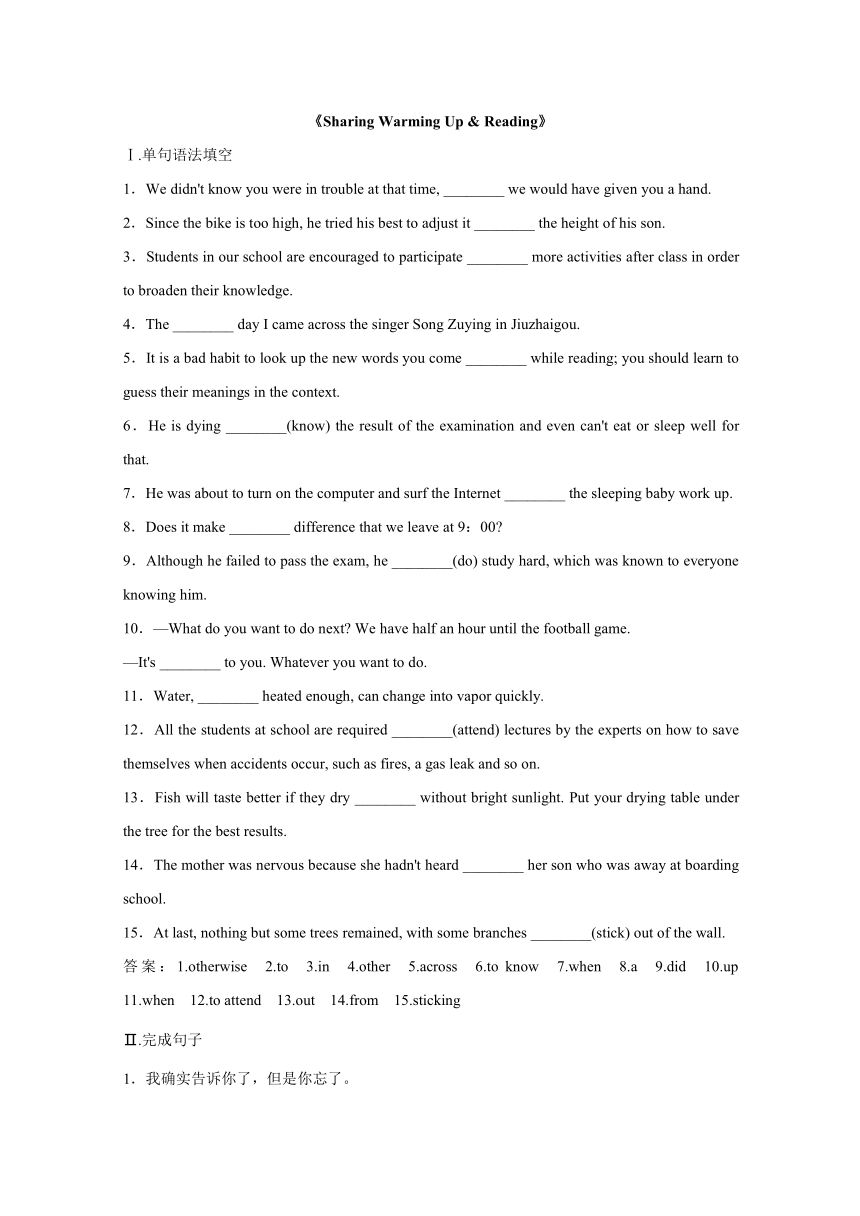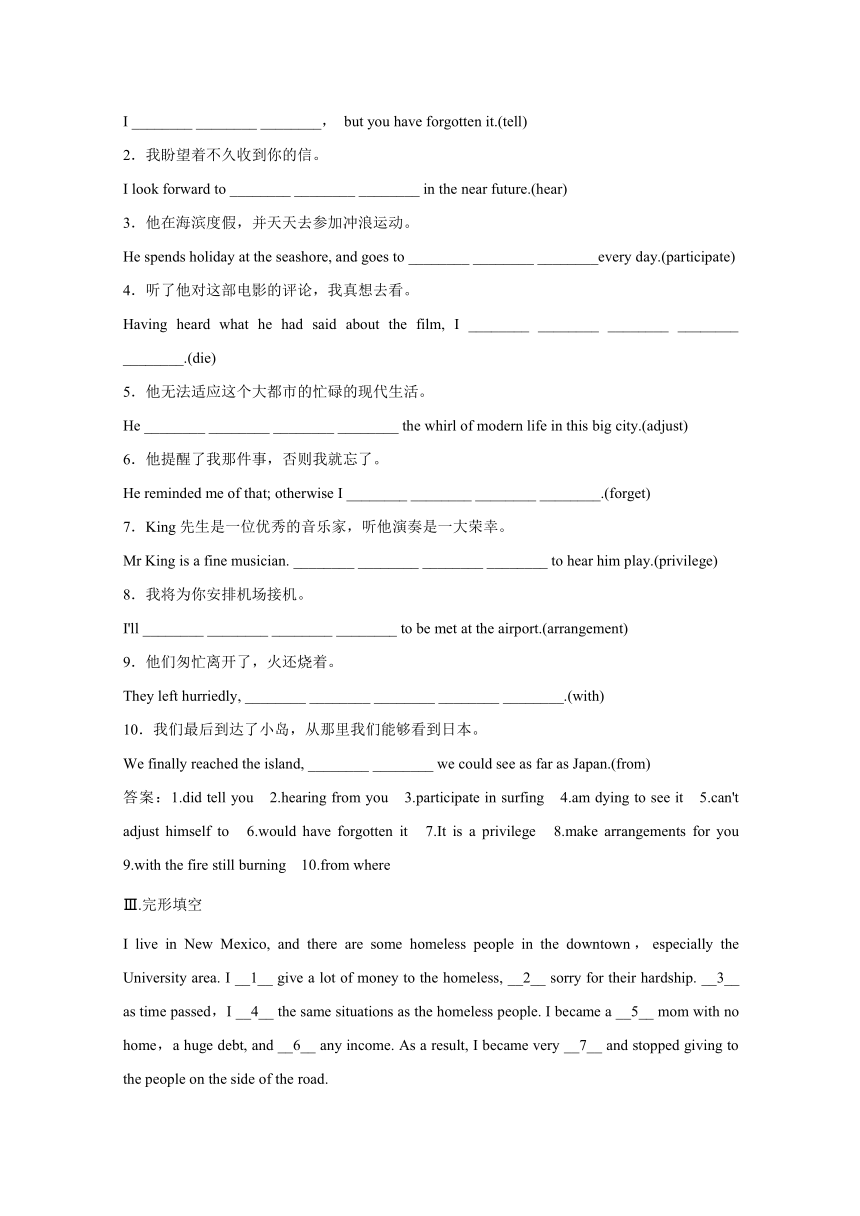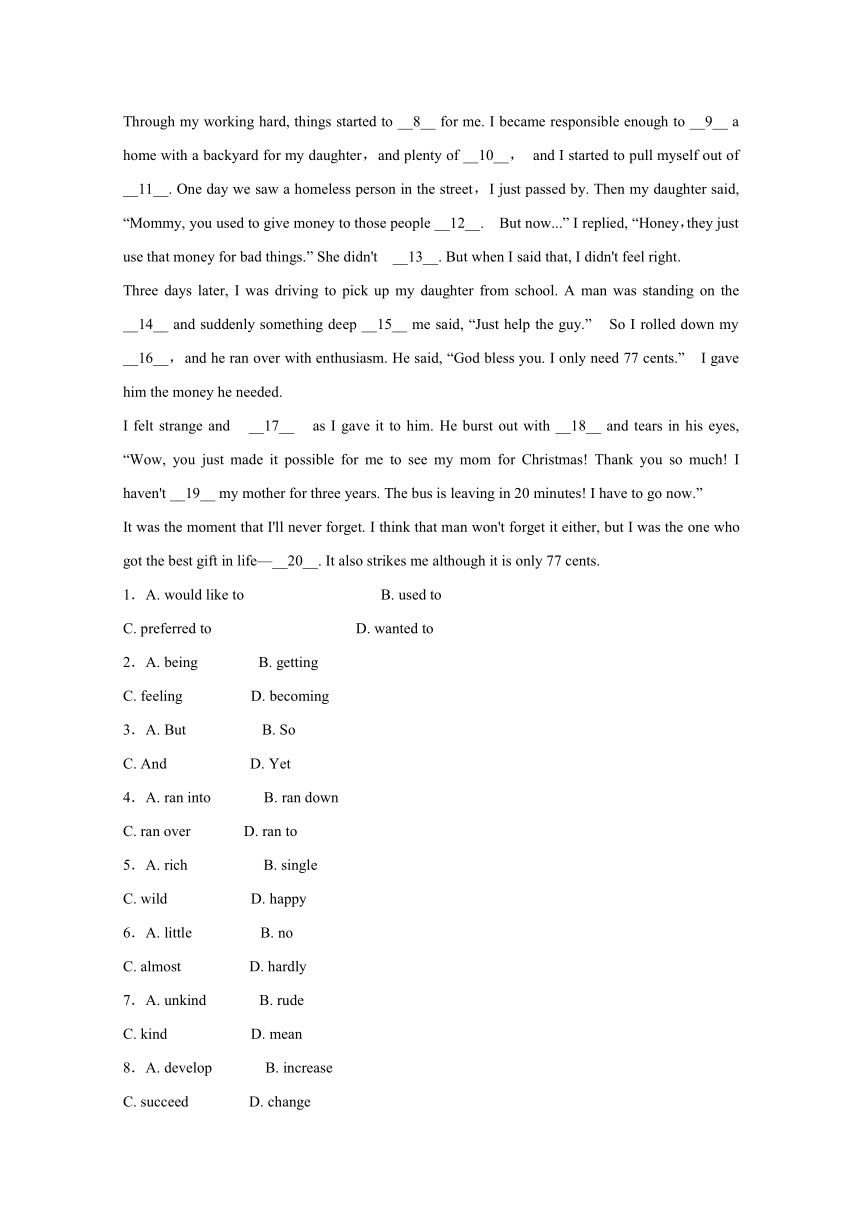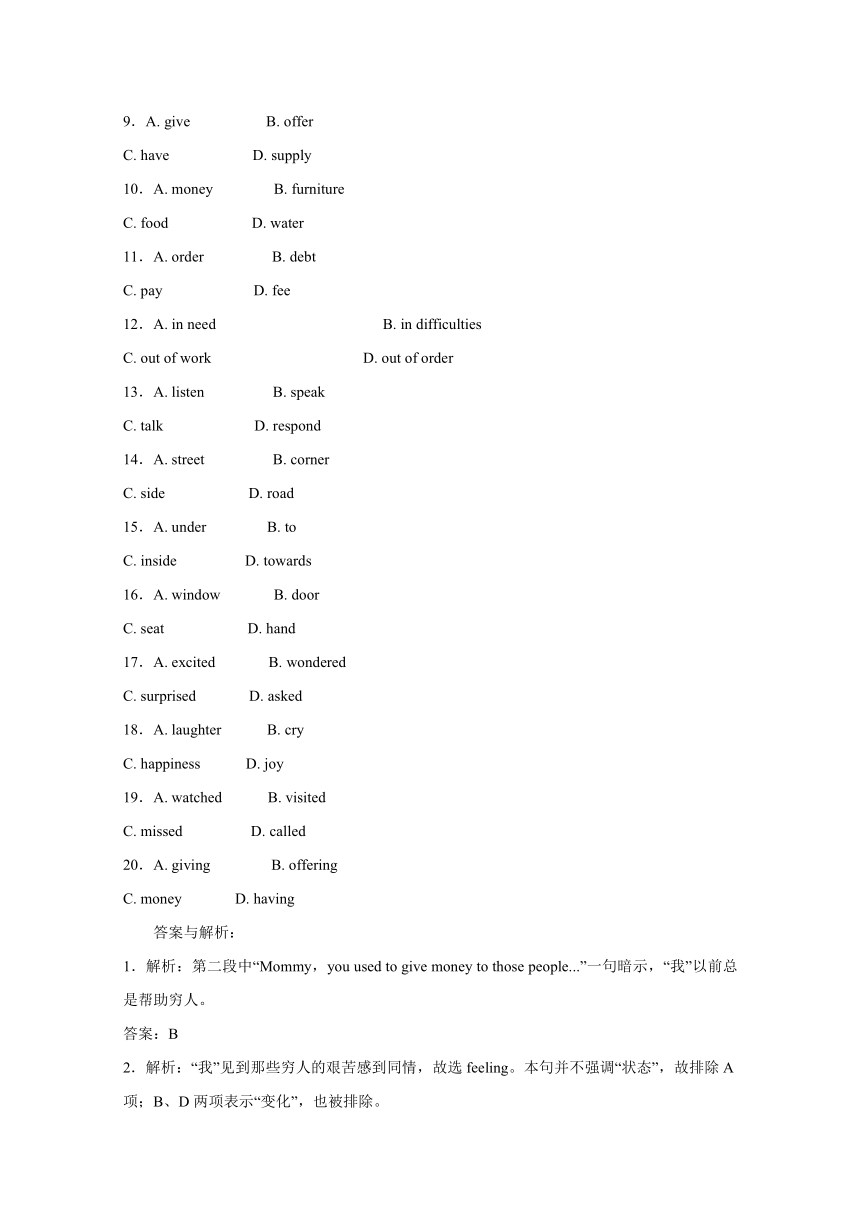2015-2016学年高中英语 4.1《Sharing Warming Up & Reading》课时作业(含部分答案解析)
文档属性
| 名称 | 2015-2016学年高中英语 4.1《Sharing Warming Up & Reading》课时作业(含部分答案解析) |

|
|
| 格式 | zip | ||
| 文件大小 | 18.9KB | ||
| 资源类型 | 教案 | ||
| 版本资源 | 人教版(新课程标准) | ||
| 科目 | 英语 | ||
| 更新时间 | 2016-04-20 00:00:00 | ||
图片预览




文档简介
《Sharing Warming Up & Reading》
Ⅰ.单句语法填空
1.We didn't know you were in trouble at that time, ________ we would have given you a hand.
2.Since the bike is too high, he tried his best to adjust it ________ the height of his son.
3.Students in our school are encouraged to participate ________ more activities after class in order to broaden their knowledge.
4.The ________ day I came across the singer Song Zuying in Jiuzhaigou.
5.It is a bad habit to look up the new words you come ________ while reading; you should learn to guess their meanings in the context.
6.He is dying ________(know) the result of the examination and even can't eat or sleep well for that.
7.He was about to turn on the computer and surf the Internet ________ the sleeping baby work up.
8.Does it make ________ difference that we leave at 9:00
9.Although he failed to pass the exam, he ________(do) study hard, which was known to everyone knowing him.
10.—What do you want to do next We have half an hour until the football game.
—It's ________ to you. Whatever you want to do.
11.Water, ________ heated enough, can change into vapor quickly.
12.All the students at school are required ________(attend) lectures by the experts on how to save themselves when accidents occur, such as fires, a gas leak and so on.
13.Fish will taste better if they dry ________ without bright sunlight. Put your drying table under the tree for the best results.
14.The mother was nervous because she hadn't heard ________ her son who was away at boarding school.
15.At last, nothing but some trees remained, with some branches ________(stick) out of the wall.
答案:1.otherwise 2.to 3.in 4.other 5.across 6.to know 7.when 8.a 9.did 10.up 11.when 12.to attend 13.out 14.from 15.sticking
Ⅱ.完成句子
1.我确实告诉你了,但是你忘了。
I ________ ________ ________, but you have forgotten it.(tell)
2.我盼望着不久收到你的信。
I look forward to ________ ________ ________ in the near future.(hear)
3.他在海滨度假,并天天去参加冲浪运动。
He spends holiday at the seashore, and goes to ________ ________ ________every day.(participate)
4.听了他对这部电影的评论,我真想去看。
Having heard what he had said about the film, I ________ ________ ________ ________ ________.(die)
5.他无法适应这个大都市的忙碌的现代生活。
He ________ ________ ________ ________ the whirl of modern life in this big city.(adjust)
6.他提醒了我那件事,否则我就忘了。
He reminded me of that; otherwise I ________ ________ ________ ________.(forget)
7.King先生是一位优秀的音乐家,听他演奏是一大荣幸。
Mr King is a fine musician. ________ ________ ________ ________ to hear him play.(privilege)
8.我将为你安排机场接机。
I'll ________ ________ ________ ________ to be met at the airport.(arrangement)
9.他们匆忙离开了,火还烧着。
They left hurriedly, ________ ________ ________ ________ ________.(with)
10.我们最后到达了小岛,从那里我们能够看到日本。
We finally reached the island, ________ ________ we could see as far as Japan.(from)
答案:1.did tell you 2.hearing from you 3.participate in surfing 4.am dying to see it 5.can't adjust himself to 6.would have forgotten it 7.It is a privilege 8.make arrangements for you 9.with the fire still burning 10.from where
Ⅲ.完形填空
I live in New Mexico, and there are some homeless people in the downtown,especially the University area. I __1__ give a lot of money to the homeless, __2__ sorry for their hardship. __3__ as time passed,I __4__ the same situations as the homeless people. I became a __5__ mom with no home,a huge debt, and __6__ any income. As a result, I became very __7__ and stopped giving to the people on the side of the road.
Through my working hard, things started to __8__ for me. I became responsible enough to __9__ a home with a backyard for my daughter,and plenty of __10__, and I started to pull myself out of __11__. One day we saw a homeless person in the street,I just passed by. Then my daughter said, “Mommy, you used to give money to those people __12__. But now...” I replied, “Honey,they just use that money for bad things.” She didn't __13__. But when I said that, I didn't feel right.
Three days later, I was driving to pick up my daughter from school. A man was standing on the __14__ and suddenly something deep __15__ me said, “Just help the guy.” So I rolled down my __16__,and he ran over with enthusiasm. He said, “God bless you. I only need 77 cents.” I gave him the money he needed.
I felt strange and __17__ as I gave it to him. He burst out with __18__ and tears in his eyes, “Wow, you just made it possible for me to see my mom for Christmas! Thank you so much! I haven't __19__ my mother for three years. The bus is leaving in 20 minutes! I have to go now.”
It was the moment that I'll never forget. I think that man won't forget it either, but I was the one who got the best gift in life—__20__. It also strikes me although it is only 77 cents.
1.A. would like to B. used to
C. preferred to D. wanted to
2.A. being B. getting
C. feeling D. becoming
3.A. But B. So
C. And D. Yet
4.A. ran into B. ran down
C. ran over D. ran to
5.A. rich B. single
C. wild D. happy
6.A. little B. no
C. almost D. hardly
7.A. unkind B. rude
C. kind D. mean
8.A. develop B. increase
C. succeed D. change
9.A. give B. offer
C. have D. supply
10.A. money B. furniture
C. food D. water
11.A. order B. debt
C. pay D. fee
12.A. in need B. in difficulties
C. out of work D. out of order
13.A. listen B. speak
C. talk D. respond
14.A. street B. corner
C. side D. road
15.A. under B. to
C. inside D. towards
16.A. window B. door
C. seat D. hand
17.A. excited B. wondered
C. surprised D. asked
18.A. laughter B. cry
C. happiness D. joy
19.A. watched B. visited
C. missed D. called
20.A. giving B. offering
C. money D. having
??答案与解析:
1.解析:第二段中“Mommy,you used to give money to those people...”一句暗示,“我”以前总是帮助穷人。
答案:B
2.解析:“我”见到那些穷人的艰苦感到同情,故选feeling。本句并不强调“状态”,故排除A项;B、D两项表示“变化”,也被排除。
答案:C
3.解析:由下文可知,随着时间的推移,“我”的处境也和他们一样窘迫,因此前后句之间为转折关系,空白处应填But。
答案:A
4.解析:run into沦落到,进入;run down撞倒,撞沉,走下坡路,垮掉;run over撞倒,撞翻并轧过;run to驱车(送某人)去,跑向。后面的宾语是the same situations,因此应填run into。
答案:A
5.解析:根据上文内容,可直接排除A(富有的),D(幸福的)两项;C项意为“疯狂的,野的”,也不合逻辑。“我”变成了一位“单身母亲”(single mother),与下文“我”没有住房、负债累累、几乎没有收入的境况相呼应。
答案:B
6.解析:本空后的any为做本题的关键,almost和little不能与any连用;no(=not any)也不能和any连用;hardly=almost not,not any=no,故hardly any=almost no,表示“几乎没有”,符合语境。
答案:D
7.解析:因为自己也变得很穷,所以“我”变得吝啬、自私(mean),下句说“我”不再给那些在路边的穷人以帮助,也说明“我”变成一个吝啬的人了。unkind无情的,不亲切的,不厚道的;rude粗鲁的;kind热心的,以上三项与“贫穷”关系不大,故被排除。
答案:D
8.解析:下句中的“a home with a backyard for my daughter,and plenty of...”说明“我”的处境有所好转,事情有了变化(change)。develop(使某人/某事物)发展,发育,成长,发达;increase增加;succeed成功。
答案:D
9.解析:根据上下文及my daughter前的介词for,可直接排除give,offer,supply,因为这三个词的用法是“give/offer/supply sth. to sb.”。“我”拥有一个带后院的房子。
答案:C
10.解析:根据上文意思,可直接排除D项;而作为生活的基本条件,食物要比家具、金钱更重要。
答案:C
11.解析:上段谈到a huge debt,而现在“我”还清了债务(debt)。pull sb. out of sth.使某人脱离某事。
答案:B
12.解析:in need贫穷的,困窘的。前一句的“a homeless people”暗示此处选A。people in need贫穷的人们。in difficulties处于困境中的,在此处不如in need贴切,故被排除。out of work失业的;out of order次序颠倒,不整齐,均不合逻辑,可直接排除。
答案:A
13.解析:respond回答,响应,与reply同义。女儿没有回答,说明她不同意妈妈的说法。
答案:D
14.解析:根据本句中的standing(正站着,表静止)及下文的“he ran over with enthusiasm”(他赶紧跑过来),说明他当时不在街上(on the street)或路上(on the road),因为街上和路上是行车或路人行走的地方,不适宜站在那里乞讨。on the side改为on the roadside更佳。on the corner在角落,在转角处。站在大街的拐角处应该是比较符合逻辑的乞讨处。
答案:B
15.解析:inside内心的,内部的,里面的。此处指“我”内心涌出一种帮助他人的欲望。
答案:C
16.解析:由前文的“I was driving to pick up my daughter from school”可判断,“我”此时是在车上,因此是摇下车窗(window)。
答案:A
17.解析:在“我”给他钱的时候,“我”感觉非常奇怪。介词and表示并列,surprised与strange在意义上更贴近。
答案:C
18.解析:从下文得知,他三年没有回家看妈妈了,现在有了路费可以回家了,他非常高兴(joy),激动得热泪盈眶。
答案:D
19.解析:宾语是my mother,应填visit,表示“看望,探望”。watch守候,看,照顾,注视;miss想念;call打电话。
答案:B
20.解析:本句点出了文章的主题。giving(给予)是“我”得到的最好的生活礼物。
答案:A
Ⅳ.阅读理解
I love charity(慈善) shops and so do lots of other people in Britain because you find quite a few of them on every high street. The charity shop is a British institution, selling everything from clothes to electric goods,all at very good prices. You can get things you won't find in the shops anymore. The thing I like best about them is that your money is going to a good cause and not into the pockets of profit-driven companies, and you are not damaging the planet, but finding a new home for unwanted goods.
The first charity shop was opened in 1947 by Oxfam. The famous charity's appeal to aid postwar Greece had been so successful that it had been flooded with donations(捐赠物). They decided to set up a shop to sell some of these donations to raise money for that appeal. Now there are over 7,000 charity shops in the UK. My favourite charity shop in my hometown is the Red Cross shop, where I always find children's books,all 10 or 20 pence each.
Most of the people working in the charity shops are volunteers,although there is often a manager who gets paid. Over 90% of the goods in the charity shops are donated by the public. Every morning you see bags of unwanted items outside the front of shops, although they don't encourage this, rather ask people to bring things in when the shop is open.
The shops have very low running costs: all profits go to charity work. Charity shops raise more than £110 million a year,funding(资助) medical research,overseas aid, supporting sick and poor children, homeless and disabled people, and much more. What better place to spend your money You get something special for a very good price and a good moral sense. You provide funds to a good cause and tread lightly on the environment.
1.The author loves the charity shop mainly because of ________.
A.its convenient location
B.its great variety of goods
C.its spirit of goodwill
D.its nice shopping environment
2.The first charity shop in the UK was set up to ________.
A.sell cheap products
B.deal with unwanted things
C.raise money for patients
D.help a foreign country
3.According to the passage, who will get paid that works for the charity shops
A.The manager. B.The volunteers.
C.The donators. D.Nobody.
4.Which of the following is TRUE about charity shops
A.The operating costs are very low.
B.The staff are usually well paid.
C.90% of the donations are second-hand.
D.They are open twenty-four hours a day.
5.Which of the following may be the best title for the passage
A.What to Buy in a Charity Shop
B.Charity Shop: Its Origin & Development
C.Charity Shop:Where You Buy to Donate
D.The Public's Concern about Charity Shops
答案与解析:
本文为一篇记叙文。文章讲述了英国慈善商店出现的原因,并指出去慈善商店购物或将废旧物品捐赠给慈善商店的好处。另外,作者对慈善商店的运营及其收入的分配情况进行了简要介绍。
1.解析:推理判断题。由第一段第四句中的“The thing I like best about them is that your money is going to a good cause(我最喜欢慈善商店的一点是你的钱将会用于有用的事业)”可推断出C项为正确答案。goodwill意为“善意”。
答案:C
2.解析:细节理解题。由第二段第二、三句“The famous charity's appeal to aid postwar Greece had been so successful ...raise money for that appeal.”可知第一个慈善商店的建立是为了筹钱援助战后的希腊。而从文章的第一段可知作者是英国人。因此,D项正确。
答案:D
3.解析:根据文章第三段第一句“Most of the people working in the charity shops are volunteers,although there is often a manager who gets paid.”可确定答案。
答案:A
4.解析:细节理解题。由第四段第一句“The shops have very low running costs ...”可知A项正确,running相当于选项中operating的含义,意为“运营”。由第三段第一句中“volunteers(志愿者)”可知B项不正确。由第三段第二句可知慈善商店中90%以上的商品为公众所捐赠,但由此并不能推出是“二手货”,故C项不正确。D项文中未提及。
答案:A
5.解析:主旨大意题。本文的最后一句为主题句。由最后一段倒数第一、二句中的a good moral sense(好的道德感)和You provide funds to a good cause(你为一项有意义的事业提供资金)可知C项为最好的题目,即Charity Shop:Where You Buy to Donate(慈善商店——一个买东西就相当于捐款的地方)。
答案:C
Ⅰ.单句语法填空
1.We didn't know you were in trouble at that time, ________ we would have given you a hand.
2.Since the bike is too high, he tried his best to adjust it ________ the height of his son.
3.Students in our school are encouraged to participate ________ more activities after class in order to broaden their knowledge.
4.The ________ day I came across the singer Song Zuying in Jiuzhaigou.
5.It is a bad habit to look up the new words you come ________ while reading; you should learn to guess their meanings in the context.
6.He is dying ________(know) the result of the examination and even can't eat or sleep well for that.
7.He was about to turn on the computer and surf the Internet ________ the sleeping baby work up.
8.Does it make ________ difference that we leave at 9:00
9.Although he failed to pass the exam, he ________(do) study hard, which was known to everyone knowing him.
10.—What do you want to do next We have half an hour until the football game.
—It's ________ to you. Whatever you want to do.
11.Water, ________ heated enough, can change into vapor quickly.
12.All the students at school are required ________(attend) lectures by the experts on how to save themselves when accidents occur, such as fires, a gas leak and so on.
13.Fish will taste better if they dry ________ without bright sunlight. Put your drying table under the tree for the best results.
14.The mother was nervous because she hadn't heard ________ her son who was away at boarding school.
15.At last, nothing but some trees remained, with some branches ________(stick) out of the wall.
答案:1.otherwise 2.to 3.in 4.other 5.across 6.to know 7.when 8.a 9.did 10.up 11.when 12.to attend 13.out 14.from 15.sticking
Ⅱ.完成句子
1.我确实告诉你了,但是你忘了。
I ________ ________ ________, but you have forgotten it.(tell)
2.我盼望着不久收到你的信。
I look forward to ________ ________ ________ in the near future.(hear)
3.他在海滨度假,并天天去参加冲浪运动。
He spends holiday at the seashore, and goes to ________ ________ ________every day.(participate)
4.听了他对这部电影的评论,我真想去看。
Having heard what he had said about the film, I ________ ________ ________ ________ ________.(die)
5.他无法适应这个大都市的忙碌的现代生活。
He ________ ________ ________ ________ the whirl of modern life in this big city.(adjust)
6.他提醒了我那件事,否则我就忘了。
He reminded me of that; otherwise I ________ ________ ________ ________.(forget)
7.King先生是一位优秀的音乐家,听他演奏是一大荣幸。
Mr King is a fine musician. ________ ________ ________ ________ to hear him play.(privilege)
8.我将为你安排机场接机。
I'll ________ ________ ________ ________ to be met at the airport.(arrangement)
9.他们匆忙离开了,火还烧着。
They left hurriedly, ________ ________ ________ ________ ________.(with)
10.我们最后到达了小岛,从那里我们能够看到日本。
We finally reached the island, ________ ________ we could see as far as Japan.(from)
答案:1.did tell you 2.hearing from you 3.participate in surfing 4.am dying to see it 5.can't adjust himself to 6.would have forgotten it 7.It is a privilege 8.make arrangements for you 9.with the fire still burning 10.from where
Ⅲ.完形填空
I live in New Mexico, and there are some homeless people in the downtown,especially the University area. I __1__ give a lot of money to the homeless, __2__ sorry for their hardship. __3__ as time passed,I __4__ the same situations as the homeless people. I became a __5__ mom with no home,a huge debt, and __6__ any income. As a result, I became very __7__ and stopped giving to the people on the side of the road.
Through my working hard, things started to __8__ for me. I became responsible enough to __9__ a home with a backyard for my daughter,and plenty of __10__, and I started to pull myself out of __11__. One day we saw a homeless person in the street,I just passed by. Then my daughter said, “Mommy, you used to give money to those people __12__. But now...” I replied, “Honey,they just use that money for bad things.” She didn't __13__. But when I said that, I didn't feel right.
Three days later, I was driving to pick up my daughter from school. A man was standing on the __14__ and suddenly something deep __15__ me said, “Just help the guy.” So I rolled down my __16__,and he ran over with enthusiasm. He said, “God bless you. I only need 77 cents.” I gave him the money he needed.
I felt strange and __17__ as I gave it to him. He burst out with __18__ and tears in his eyes, “Wow, you just made it possible for me to see my mom for Christmas! Thank you so much! I haven't __19__ my mother for three years. The bus is leaving in 20 minutes! I have to go now.”
It was the moment that I'll never forget. I think that man won't forget it either, but I was the one who got the best gift in life—__20__. It also strikes me although it is only 77 cents.
1.A. would like to B. used to
C. preferred to D. wanted to
2.A. being B. getting
C. feeling D. becoming
3.A. But B. So
C. And D. Yet
4.A. ran into B. ran down
C. ran over D. ran to
5.A. rich B. single
C. wild D. happy
6.A. little B. no
C. almost D. hardly
7.A. unkind B. rude
C. kind D. mean
8.A. develop B. increase
C. succeed D. change
9.A. give B. offer
C. have D. supply
10.A. money B. furniture
C. food D. water
11.A. order B. debt
C. pay D. fee
12.A. in need B. in difficulties
C. out of work D. out of order
13.A. listen B. speak
C. talk D. respond
14.A. street B. corner
C. side D. road
15.A. under B. to
C. inside D. towards
16.A. window B. door
C. seat D. hand
17.A. excited B. wondered
C. surprised D. asked
18.A. laughter B. cry
C. happiness D. joy
19.A. watched B. visited
C. missed D. called
20.A. giving B. offering
C. money D. having
??答案与解析:
1.解析:第二段中“Mommy,you used to give money to those people...”一句暗示,“我”以前总是帮助穷人。
答案:B
2.解析:“我”见到那些穷人的艰苦感到同情,故选feeling。本句并不强调“状态”,故排除A项;B、D两项表示“变化”,也被排除。
答案:C
3.解析:由下文可知,随着时间的推移,“我”的处境也和他们一样窘迫,因此前后句之间为转折关系,空白处应填But。
答案:A
4.解析:run into沦落到,进入;run down撞倒,撞沉,走下坡路,垮掉;run over撞倒,撞翻并轧过;run to驱车(送某人)去,跑向。后面的宾语是the same situations,因此应填run into。
答案:A
5.解析:根据上文内容,可直接排除A(富有的),D(幸福的)两项;C项意为“疯狂的,野的”,也不合逻辑。“我”变成了一位“单身母亲”(single mother),与下文“我”没有住房、负债累累、几乎没有收入的境况相呼应。
答案:B
6.解析:本空后的any为做本题的关键,almost和little不能与any连用;no(=not any)也不能和any连用;hardly=almost not,not any=no,故hardly any=almost no,表示“几乎没有”,符合语境。
答案:D
7.解析:因为自己也变得很穷,所以“我”变得吝啬、自私(mean),下句说“我”不再给那些在路边的穷人以帮助,也说明“我”变成一个吝啬的人了。unkind无情的,不亲切的,不厚道的;rude粗鲁的;kind热心的,以上三项与“贫穷”关系不大,故被排除。
答案:D
8.解析:下句中的“a home with a backyard for my daughter,and plenty of...”说明“我”的处境有所好转,事情有了变化(change)。develop(使某人/某事物)发展,发育,成长,发达;increase增加;succeed成功。
答案:D
9.解析:根据上下文及my daughter前的介词for,可直接排除give,offer,supply,因为这三个词的用法是“give/offer/supply sth. to sb.”。“我”拥有一个带后院的房子。
答案:C
10.解析:根据上文意思,可直接排除D项;而作为生活的基本条件,食物要比家具、金钱更重要。
答案:C
11.解析:上段谈到a huge debt,而现在“我”还清了债务(debt)。pull sb. out of sth.使某人脱离某事。
答案:B
12.解析:in need贫穷的,困窘的。前一句的“a homeless people”暗示此处选A。people in need贫穷的人们。in difficulties处于困境中的,在此处不如in need贴切,故被排除。out of work失业的;out of order次序颠倒,不整齐,均不合逻辑,可直接排除。
答案:A
13.解析:respond回答,响应,与reply同义。女儿没有回答,说明她不同意妈妈的说法。
答案:D
14.解析:根据本句中的standing(正站着,表静止)及下文的“he ran over with enthusiasm”(他赶紧跑过来),说明他当时不在街上(on the street)或路上(on the road),因为街上和路上是行车或路人行走的地方,不适宜站在那里乞讨。on the side改为on the roadside更佳。on the corner在角落,在转角处。站在大街的拐角处应该是比较符合逻辑的乞讨处。
答案:B
15.解析:inside内心的,内部的,里面的。此处指“我”内心涌出一种帮助他人的欲望。
答案:C
16.解析:由前文的“I was driving to pick up my daughter from school”可判断,“我”此时是在车上,因此是摇下车窗(window)。
答案:A
17.解析:在“我”给他钱的时候,“我”感觉非常奇怪。介词and表示并列,surprised与strange在意义上更贴近。
答案:C
18.解析:从下文得知,他三年没有回家看妈妈了,现在有了路费可以回家了,他非常高兴(joy),激动得热泪盈眶。
答案:D
19.解析:宾语是my mother,应填visit,表示“看望,探望”。watch守候,看,照顾,注视;miss想念;call打电话。
答案:B
20.解析:本句点出了文章的主题。giving(给予)是“我”得到的最好的生活礼物。
答案:A
Ⅳ.阅读理解
I love charity(慈善) shops and so do lots of other people in Britain because you find quite a few of them on every high street. The charity shop is a British institution, selling everything from clothes to electric goods,all at very good prices. You can get things you won't find in the shops anymore. The thing I like best about them is that your money is going to a good cause and not into the pockets of profit-driven companies, and you are not damaging the planet, but finding a new home for unwanted goods.
The first charity shop was opened in 1947 by Oxfam. The famous charity's appeal to aid postwar Greece had been so successful that it had been flooded with donations(捐赠物). They decided to set up a shop to sell some of these donations to raise money for that appeal. Now there are over 7,000 charity shops in the UK. My favourite charity shop in my hometown is the Red Cross shop, where I always find children's books,all 10 or 20 pence each.
Most of the people working in the charity shops are volunteers,although there is often a manager who gets paid. Over 90% of the goods in the charity shops are donated by the public. Every morning you see bags of unwanted items outside the front of shops, although they don't encourage this, rather ask people to bring things in when the shop is open.
The shops have very low running costs: all profits go to charity work. Charity shops raise more than £110 million a year,funding(资助) medical research,overseas aid, supporting sick and poor children, homeless and disabled people, and much more. What better place to spend your money You get something special for a very good price and a good moral sense. You provide funds to a good cause and tread lightly on the environment.
1.The author loves the charity shop mainly because of ________.
A.its convenient location
B.its great variety of goods
C.its spirit of goodwill
D.its nice shopping environment
2.The first charity shop in the UK was set up to ________.
A.sell cheap products
B.deal with unwanted things
C.raise money for patients
D.help a foreign country
3.According to the passage, who will get paid that works for the charity shops
A.The manager. B.The volunteers.
C.The donators. D.Nobody.
4.Which of the following is TRUE about charity shops
A.The operating costs are very low.
B.The staff are usually well paid.
C.90% of the donations are second-hand.
D.They are open twenty-four hours a day.
5.Which of the following may be the best title for the passage
A.What to Buy in a Charity Shop
B.Charity Shop: Its Origin & Development
C.Charity Shop:Where You Buy to Donate
D.The Public's Concern about Charity Shops
答案与解析:
本文为一篇记叙文。文章讲述了英国慈善商店出现的原因,并指出去慈善商店购物或将废旧物品捐赠给慈善商店的好处。另外,作者对慈善商店的运营及其收入的分配情况进行了简要介绍。
1.解析:推理判断题。由第一段第四句中的“The thing I like best about them is that your money is going to a good cause(我最喜欢慈善商店的一点是你的钱将会用于有用的事业)”可推断出C项为正确答案。goodwill意为“善意”。
答案:C
2.解析:细节理解题。由第二段第二、三句“The famous charity's appeal to aid postwar Greece had been so successful ...raise money for that appeal.”可知第一个慈善商店的建立是为了筹钱援助战后的希腊。而从文章的第一段可知作者是英国人。因此,D项正确。
答案:D
3.解析:根据文章第三段第一句“Most of the people working in the charity shops are volunteers,although there is often a manager who gets paid.”可确定答案。
答案:A
4.解析:细节理解题。由第四段第一句“The shops have very low running costs ...”可知A项正确,running相当于选项中operating的含义,意为“运营”。由第三段第一句中“volunteers(志愿者)”可知B项不正确。由第三段第二句可知慈善商店中90%以上的商品为公众所捐赠,但由此并不能推出是“二手货”,故C项不正确。D项文中未提及。
答案:A
5.解析:主旨大意题。本文的最后一句为主题句。由最后一段倒数第一、二句中的a good moral sense(好的道德感)和You provide funds to a good cause(你为一项有意义的事业提供资金)可知C项为最好的题目,即Charity Shop:Where You Buy to Donate(慈善商店——一个买东西就相当于捐款的地方)。
答案:C
